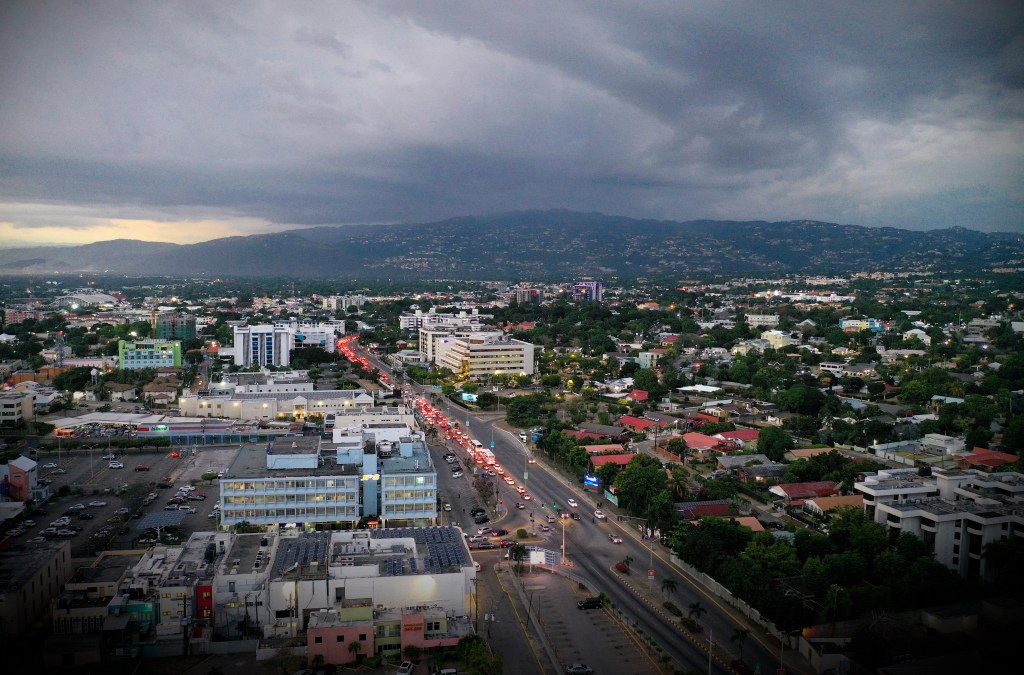As governments scrambled to lock down their populations after the COVID-19 pandemic was declared last March, some countries had plans underway to reopen. By June, Jamaica became one of the first countries to open its borders.
Tourism represents about one-fifth of Jamaica’s economy. In 2019 alone, four million travelers visited Jamaica, bringing thousands of jobs to its three million residents. But as COVID-19 stretched into the summer, Jamaica’s economy was in free fall, and tourism was its only way back — even if that meant at the expense of public health.
The Jamaican government contracted with Amber Group, a technology company headquartered in Kingston, to build a border entry system allowing residents and travelers back onto the island. The system was named JamCOVID and was rolled out as an app and a website to allow visitors to get screened before they arrive. To cross the border, travelers had to upload a negative COVID-19 test result to JamCOVID before boarding their flight from high-risk countries, including the United States.
Amber Group’s CEO Dushyant Savadia boasted that his company developed JamCOVID in “three days” and that it effectively donated the system to the Jamaican government, which in turn pays Amber Group for additional features and customizations. The rollout appeared to be a success, and Amber Group later secured contracts to roll out its border entry system to at least four other Caribbean islands.
But last month TechCrunch revealed that JamCOVID exposed immigration documents, passport numbers and COVID-19 lab test results on close to half a million travelers — including many Americans — who visited the island over the past year. Amber Group had set the access to the JamCOVID cloud server to public, allowing anyone to access its data from their web browser.
Whether the data exposure was caused by human error or negligence, it was an embarrassing mistake for a technology company — and, by extension, the Jamaican government — to make.
And that might have been the end of it. Instead, the government’s response became the story.
A trio of security lapses
By the end of the first wave of coronavirus, contact-tracing apps were still in their infancy, and few governments had plans in place to screen travelers as they arrived at their borders. It was a scramble for governments to build or acquire technology to understand the spread of the virus.
Jamaica was one of a handful of countries using location data to monitor travelers, prompting rights groups to raise concerns about privacy and data protection.
As part of an investigation into a broad range of these COVID-19 apps and services, TechCrunch found that JamCOVID was storing data on an exposed, passwordless server.
Jamaica’s immigration website exposed thousands of travelers’ data
This wasn’t the first time TechCrunch found security flaws or exposed data through our reporting. It also was not the first pandemic-related security scare. Israeli spyware maker NSO Group left real location data on an unprotected server that it used for demonstrating its new contact-tracing system. Norway was one of the first countries with a contact-tracing app, but pulled it after the country’s privacy authority found the continuous tracking of citizens’ location was a privacy risk.
Just as we have with any other story, we contacted who we thought was the server’s owner. We alerted Jamaica’s Ministry of Health to the data exposure on the weekend of February 13. But after we provided specific details of the exposure to ministry spokesperson Stephen Davidson, we did not hear back. Two days later, the data was still exposed.
After we spoke to two American travelers whose data was spilling from the server, we narrowed down the owner of the server to Amber Group. We contacted its chief executive Savadia on February 16, who acknowledged the email but did not comment, and the server was secured about an hour later.
We ran our story that afternoon. After we published, the Jamaican government issued a statement claiming the lapse was “discovered on February 16” and was “immediately rectified,” neither of which were true.
Contact Us
Got a tip? Contact us securely using SecureDrop. Find out more here.Instead, the government responded by launching a criminal investigation into whether there was any “unauthorized” access to the unprotected data that led to our first story, which we perceived to be a thinly veiled threat directed at this publication. The government said it had contacted its overseas law enforcement partners.
When reached, a spokesperson for the FBI declined to say whether the Jamaican government had contacted the agency.
Things didn’t get much better for JamCOVID. In the days that followed the first story, the government engaged a cloud consultant, Escala 24×7, to assess JamCOVID’s security. The results were not disclosed, but the company said it was confident there was “no current vulnerability” in JamCOVID. Amber Group also said that the lapse was a “completely isolated occurrence.”
A week went by and TechCrunch alerted Amber Group to two more security lapses. After the attention from the first report, a security researcher who saw the news of the first lapse found exposed private keys and passwords for JamCOVID’s servers and databases hidden on its website, and a third lapse that spilled quarantine orders for more than half a million travelers.
Amber Group and the government claimed it faced “cyberattacks, hacking and mischievous players.” In reality, the app was just not that secure.
Politically inconvenient
The security lapses come at a politically inconvenient time for the Jamaican government, as it attempts to launch a national identification system, or NIDS, for the second time. NIDS will store biographic data on Jamaican nationals, including their biometrics, such as their fingerprints.
The repeat effort comes two years after the government’s first law was struck down by Jamaica’s High Court as unconstitutional.
Critics have cited the JamCOVID security lapses as a reason to drop the proposed national database. A coalition of privacy and rights groups cited the recent issues with JamCOVID for why a national database is “potentially dangerous for Jamaicans’ privacy and security.” A spokesperson for Jamaica’s opposition party told local media that there “wasn’t much confidence in NIDS in the first place.”
Tech’s role in the COVID-19 response: Assist, don’t reinvent
It’s been more than a month since we published the first story and there are many unanswered questions, including how Amber Group secured the contract to build and run JamCOVID, how the cloud server became exposed and if security testing was conducted before its launch.
TechCrunch emailed both the Jamaican prime minister’s office and Matthew Samuda, a minister in Jamaica’s Ministry of National Security, to ask how much, if anything, the government donated or paid to Amber Group to run JamCOVID and what security requirements, if any, were agreed upon for JamCOVID. We did not get a response.
Amber Group also has not said how much it has earned from its government contracts. Amber Group’s Savadia declined to disclose the value of the contracts to one local newspaper. Savadia did not respond to our emails with questions about its contracts.
Following the second security lapse, Jamaica’s opposition party demanded that the prime minister release the contracts that govern the agreement between the government and Amber Group. Prime Minister Andrew Holness said at a press conference that the public “should know” about government contracts but warned “legal hurdles” may prevent disclosure, such as for national security reasons or when “sensitive trade and commercial information” might be disclosed.
That came days after local newspaper The Jamaica Gleaner had a request to obtain contracts revealing the salaries of state officials denied by the government under a legal clause that prevents the disclosure of an individual’s private affairs. Critics argue that taxpayers have a right to know how much government officials are paid from public funds.
Jamaica’s opposition party also asked what was done to notify victims.
Government minister Samuda initially downplayed the security lapse, claiming just 700 people were affected. We scoured social media for proof but found nothing. To date, we’ve found no evidence that the Jamaican government ever informed travelers of the security incident — either the hundreds of thousands of affected travelers whose information was exposed, or the 700 people that the government claimed it notified but has not publicly released.
TechCrunch emailed the minister to request a copy of the notice that the government allegedly sent to victims, but we did not receive a response. We also asked Amber Group and Jamaica’s prime minister’s office for comment. We did not hear back.
Many of the victims of the security lapse are from the United States. Neither of the two Americans we spoke to in our first report were notified of the breach.
Spokespeople for the attorneys general of New York and Florida, whose residents’ information was exposed, told TechCrunch that they had not heard from either the Jamaican government or the contractor, despite state laws requiring data breaches to be disclosed.
Jamaica’s JamCOVID pulled offline after third security lapse exposed travelers’ data
The reopening of Jamaica’s borders came at a cost. The island saw more than a hundred new cases of COVID-19 in the month that followed, the majority arriving from the United States. From June to August, the number of new coronavirus cases went from tens to dozens to hundreds each day.
To date, Jamaica has reported over 39,500 cases and 600 deaths caused by the pandemic.
Prime Minister Holness reflected on the decision to reopen its borders last month while in parliament to announce the country’s annual budget. He said the country’s economic decline last was “driven by a massive 70% contraction in our tourist industry.” More than 525,000 travelers — both residents and tourists — have arrived in Jamaica since the borders opened, Holness said, a figure slightly more than the number of travelers’ records found on the exposed JamCOVID server in February.
Holness defended reopening the country’s borders.
“Had we not done this the fallout in tourism revenues would have been 100% instead of 75%, there would be no recovery in employment, our balance of payment deficit would have worsened, overall government revenues would have been threatened, and there would be no argument to be made about spending more,” he said.
Both the Jamaican government and Amber Group benefited from opening the country’s borders. The government wanted to revive its falling economy, and Amber Group enriched its business with fresh government contracts. But neither paid enough attention to cybersecurity, and victims of their negligence deserve to know why.
Send tips securely over Signal and WhatsApp to +1 646-755-8849. You can also send files or documents using our SecureDrop. Learn more.































Comment